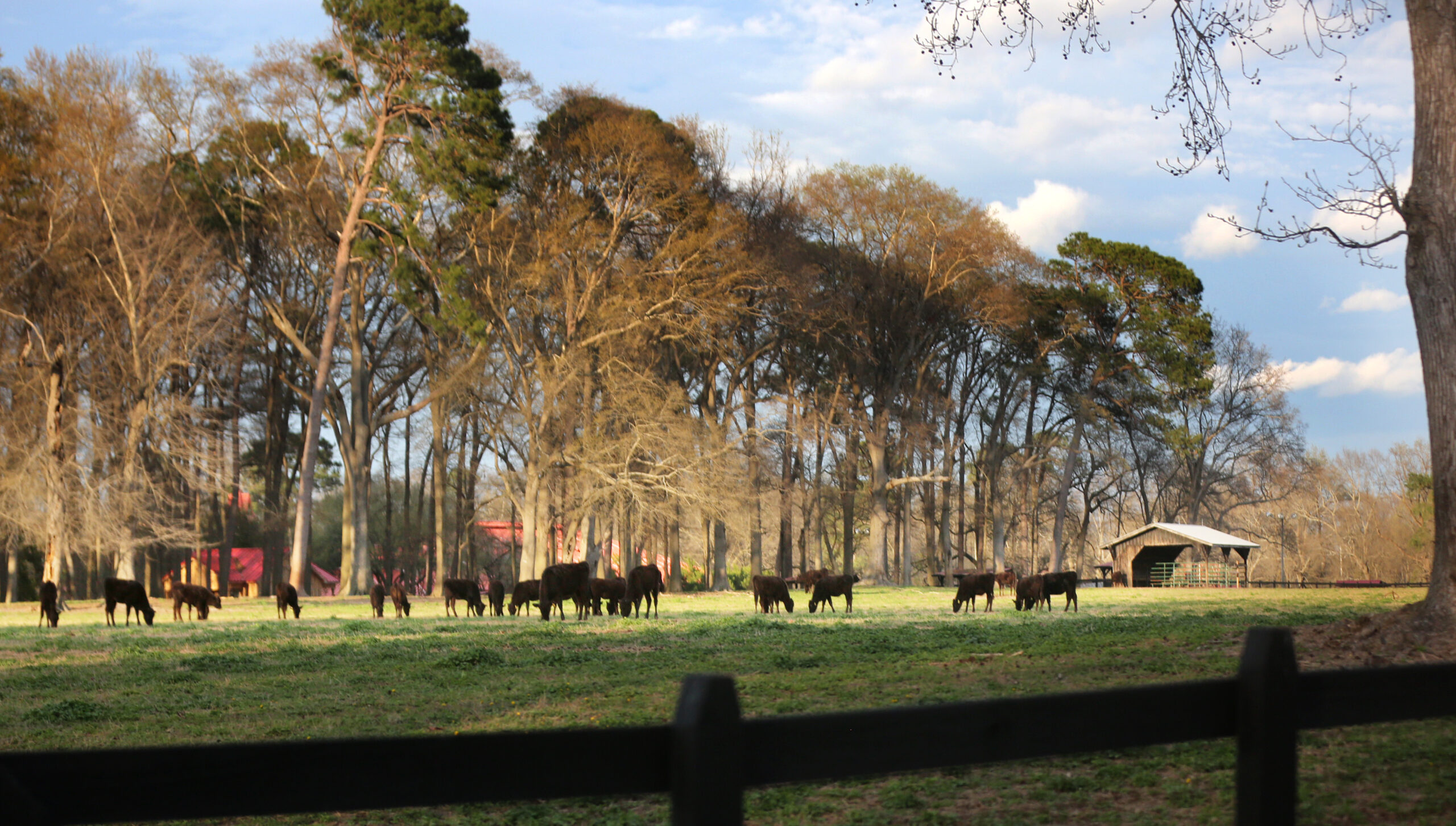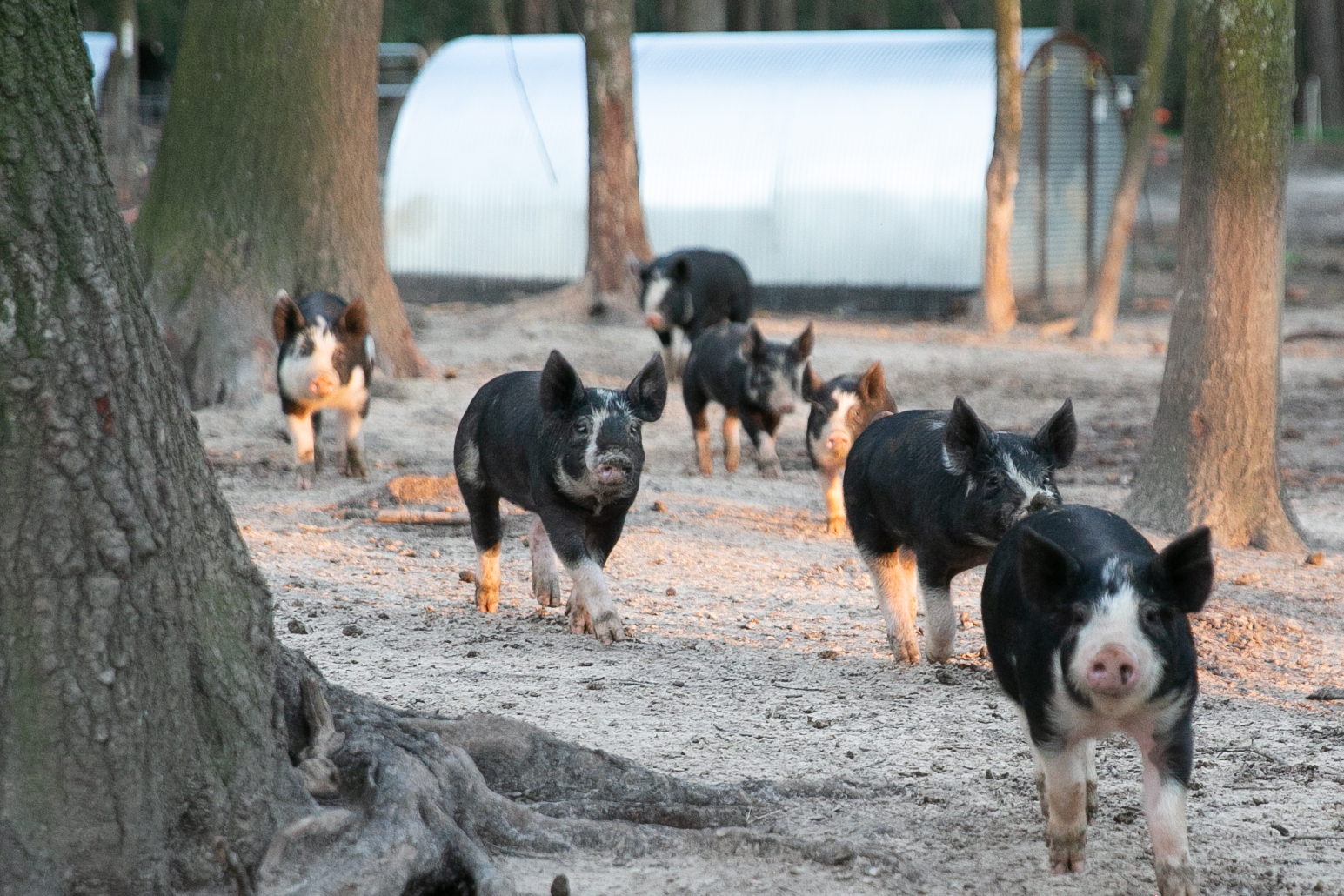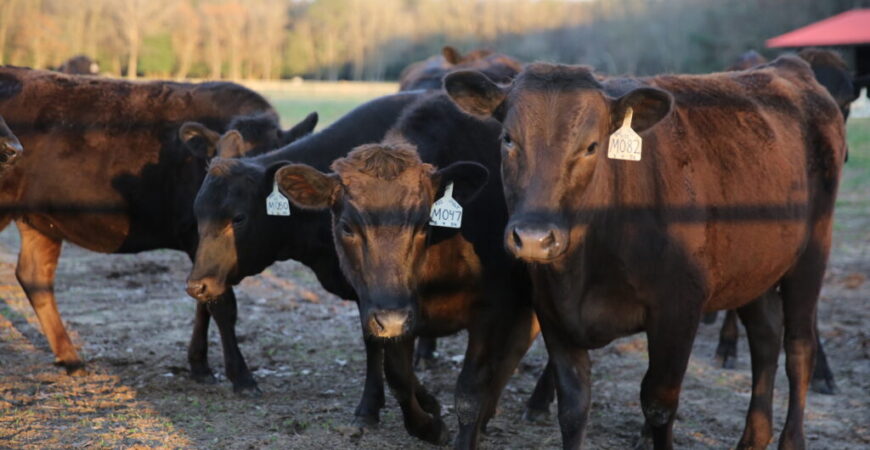Tucked in the quiet backroads of Turkey, North Carolina, a family found not just land — but purpose. Nestled within 1,300 acres of gently rolling farmland, Jaclyn Smith, her husband Reid, and their three children have created a home here.
What started as a small operation using their land in Clayton to explore the possibilities during the pandemic has evolved into a thriving agricultural venture — the Wilders brand.
We were fortunate to find farmers exiting the industry just as we started, Jaclyn told Duplin Journal, explaining it was an exciting opportunity to learn from experienced breeders as they shared their knowledge while leaving the field.

With fullblood Wagyu cattle grazing under open skies and Berkshire hogs foraging through native pastures. The rhythm of rural life offers a grounding sense of peace while working the land keeps the family connected to something greater.
At Wilders, each animal is more than just livestock — they’re an integral part of a living, breathing ecosystem that supports the family’s deeper purpose.
“Every animal is treated like they should be — they’re enjoying nature,” said Jaclyn, reflecting their commitment to ethical and compassionate care. “It takes extreme care, and we want to do it the right way. We want to be good stewards of God’s creation.”
At the heart of the Smith family’s operation is a carefully developed breeding program focused on full-blood Wagyu cattle—animals whose lineage traces directly back to Japan. Their mission is to elevate the quality of their herd through superior genetics, producing premium beef known for its exceptional marbling. From the beginning, the Smiths have been intentional about acquiring mature cows and experimenting with elite genetic lines, enabling them to build a strong foundation for both their breeding and terminal herds. This dual-herd approach allows them to balance long-term genetic improvements with ongoing beef production.

One of the most important components of their program is the use of advanced reproductive technologies, such as artificial insemination and embryo transfer. Partnering with a company called Vytelle, the family employs cutting-edge methods to extract unfertilized eggs which are then fertilized and graded for viability before being implanted into surrogate cows.
“We have a satellite lab here,” said Jaclyn. “Vytelle works extracting what they call ovocytes, which are like unfertilized eggs from the mom and then they can fertilize the eggs to create an embryo.”
This process enables them to multiply the offspring of elite animals while maintaining strict control over genetic quality. Jaclyn noted the excitement of being able to carry out this work on their property, not only for their herd but also as a resource for other cattlemen.
Their use of surrogate mothers, which include both Wagyu and larger non-Wagyu cows, reflects the family’s practical approach to herd management. Since Wagyu cows are smaller and can face challenges during birth, using larger surrogates helps reduce complications and supports stronger calf development thanks to improved milk production. Although only about a third of the implanted embryos successfully take, the results are worth the effort. The Smiths carefully manage breeding and calving cycles, aiming for two- to three-week birth windows in the spring and fall. This schedule improves survival rates and keeps both mothers and calves healthy.
Raising Wagyu cattle also requires patience. Unlike other breeds, Wagyus take 28 to 30 months to reach harvest weight, significantly increasing the cost of production. However, this extended feeding period is essential to developing the fine marbling that defines premium Wagyu beef. During their first year of life, the cattle remain on the farm before being transitioned to a finishing location.
While the cattle graze freely on pasture, their diets are supplemented with grain-based rations to fill any nutritional gaps, ensuring balanced growth and health. The Smiths grow much of their own feed but also source from local farmers. Pastures are equipped with salt blocks and mineral trays, offering essential nutrients and further supporting the animals’ well-being. The family uses a grain-finishing process to enhance this marbling, supplementing the animals’ natural pasture diet with carefully selected grains that contribute to the meat’s tenderness, flavor, and overall quality. This approach mimics traditional Wagyu practices.
To support optimal growth during this phase, the Smiths work with a Wagyu-specific nutritionist to develop tailored feed rations that enhance muscle development and fat distribution.
To further refine their breeding program, the Smiths conduct progeny testing—an evaluation method that tracks how specific sires influence carcass quality traits like marbling. By collecting and analyzing this data, they gain deeper insight into the effectiveness of their genetic pairings. This continuous improvement process is rooted in detailed tracking and a commitment to quality, ensuring that each generation of cattle is more consistent and higher performing than the last. This also allows them to maintain strict control over each phase of development, which is essential for accurate data collection and decision-making.
The family’s investment in premium genetics and long-term strategy is beginning to pay off. Some of the embryos they implanted in 2021 have now matured and are producing beef and pork that fill the family freezer. Turning an embryo into a finished steak is a three-year commitment—an example of the patience and dedication required to raise ethically managed, high-quality livestock. This kind of long-term vision sets the Smiths apart in a competitive and increasingly demanding beef market.
Beyond genetics, farm design and animal welfare are central to their success. The farm layout is designed to support the efficient movement of animals even in bad weather, with connecting alleys between pastures and working areas. This design minimizes animal stress and makes day-to-day operations smoother and safer. The family also carefully rotates cattle through pastures, ensuring that both land and animals are well cared for. This rotational system helps maintain pasture health, supports natural grazing behavior, and provides a more comfortable environment for the animals.
Lastly, the Smiths have embraced a holistic vision for their farm’s role in the Wagyu industry. In addition to raising beef, they export embryos and semen to help grow the Wagyu breed in the U.S.— a process slowed historically by limited imports. Their upcoming production sale will feature live animals and frozen genetics, allowing other breeders to benefit from their progress. Their processor also plays a key role, grading marbling based on the ninth rib and using that data to determine whether beef will be sold as steak or ground. Through these combined efforts, the Smith family is not only improving their own herd, but contributing meaningfully to the future of Wagyu cattle in the United States and beyond.
One of the distinctive and heartfelt aspects of Wilders Farm is how the Smith family raises their Berkshire pigs on open land rather than confining them in hog houses — a common practice in the area. This decision reflects the family’s core values, prioritizing animal welfare and natural behaviors over convenience and cost-efficiency. By allowing the pigs to roam freely, forage, and dig in the soil, the Smiths believe they’re not only improving the animals’ quality of life but also enhancing the flavor and nutrition of the pork. Jaclyn explained that it’s a choice they willingly make because it aligns with what they believe is right.
“Even though the economics might not work with what makes our hearts happy — it’s our piggy bank — so we can make that decision,” she said with a smile.
To further support animal health and responsible breeding, the Smiths rotate their sows and boars through designated areas, allowing plenty of space for movement and play. Jaclyn described the pigs’ joy in digging mud puddles and snuggling together — behaviors that highlight their intelligence and social nature. Currently, the farm raises between 100 to 150 pigs, with most reaching market readiness between 6 to 12 months of age. Special attention is given to the expectant sows, who are placed in dedicated maternity zones to provide a calm, nurturing environment for birthing.
With a background in education and real estate, Jaclyn brings a passion for teaching to the beef side of the business, likening it to selling homes — where explaining value, quality, and investment is key. While she focuses on customer education and sales, Reed dives deep into the genetic side of farming. Together, they emphasize the importance of educating consumers about the care, time, and ethical practices behind their Wagyu beef.
Through their e-commerce site, a general store in Clayton, and presence at farmer’s markets, they connect directly with customers.
Jacly shared that they often offer unseasoned samples of their product so that customers can taste the pure, unadulterated flavor of the meat. The response has been overwhelmingly positive, with many customers expressing their appreciation for the quality of the beef.
Although the region lacks the affluence of larger cities, Wilders has found deep-rooted support in their local community. They are especially grateful for customers who recognize and value their dedication to quality and ethical animal care. Looking ahead, their vision includes expanding their beef products onto restaurant menus nationwide while continuing to refine their herd’s genetics to consistently deliver top-tier Wagyu beef.
One of the most rewarding aspects of their journey has been the sense of belonging within the agricultural community. Jaclyn describes it as a network of hardworking, generous people who are eager to see one another succeed.
Through this network, the family has built lasting relationships with farmers both locally and internationally — from Australia to England, Scotland, and Canada — gaining valuable insights into global farming practices.
Their agricultural efforts are also deeply connected to their real estate and nonprofit work. Through One Compassion and the “Farm to Need” initiative, they help address local food insecurity by donating surplus products like ground beef to food pantries, effectively linking farmers, communities, and those in need.
The Smith family is deeply committed to sustainability and community support, making it a priority to use every part of the animal. Over two years, they refined their process based on customer preferences to minimize waste and maximize the value of each carcass, ensuring high-quality, thoughtfully crafted products. They also donate surplus cuts — especially ground beef — to local food pantries, helping address the frequent shortage of protein donations. This initiative not only provides nutritious food to those in need but also strengthens the connection between local farmers and their communities. Beyond their own farm, the Smiths actively engage with the regional farming network, attending cattle meetings and fostering relationships to support and uplift fellow producers. They are passionate about honoring the essential, often underappreciated role of farmers, who make up just 1% of the U.S. population yet feed the entire nation.
The Wilders farm has been evolving, with recent developments including the restoration of a greenhouse and the reintroduction of horses to a property built initially for cutting horses. While the farm now focuses primarily on Wagyu cattle, the family has maintained their connection to equine life through a riding arena and a performance horse division.
The farm is full of life and energy, especially in the evenings when the animals — horses included — often get the “zoomies” and playfully race around.
Looking to the future, Jaclyn told Duplin Journal that they hope to create a space for agritourism. Their long-term plans include offering hands-on farm experiences, educational opportunities, and rustic lodging for guests to immerse themselves in rural life. They’ve already built two cabins on the property, intended as future Airbnb-style accommodations. Though still in the early stages, this vision reflects their desire to create a sustainable and welcoming space where visitors can connect with animals, learn about ethical farming, and enjoy the slower pace of the countryside.
 Twitter
Twitter Facebook
Facebook Instagram
Instagram





